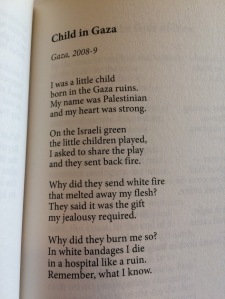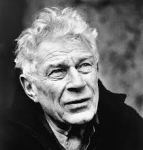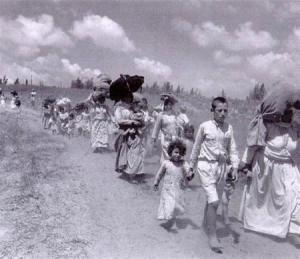As BWISP followers will know, the dynamic growth of the Boycott Divestment and Sanctions movement has led to the formation of Artists for Palestine UK, a highly organised collective representing writers, artists, filmmakers, dancers, musicians and other cultural workers united in their support of the cultural and academic boycott of Israel. BWISP remains present on the scene, ready when needed, and has been focused lately on promoting Palestinian literature in the form of A Blade of Grass: New Palestinian Poetry, a bilingual anthology that I, BWISP co-founder Naomi Foyle, edited last year for Smokestack Books.
Since our last post, readings featuring poets Farid Bitar, Maya Abu Alhayyat, Marwan Makhoul and Mustafa Abu Sneineh have taken place in East Jerusalem, Ramallah, Amman and New York, and in the UK at BlakeFest (Bognor Regis) and the Ripon Poetry Festival, the latter at a City of Sanctuary event reflecting on the refugee experience and, in the words of poet Mustafa Abu Sneineh, challenging nostalgia in favour of resistance and reinvention. All of these events have been well-attended by informed and concerned audiences with many questions to ask, building a sense of friendship and community around the anthology. A Blade of Grass also continues to provoke thoughtful and appreciative reviews in journals from Poetry Review to Sofia, the literary journal of the Sea of Faith Network, where Nora Parr declares that the book ‘doesn’t deliver in the way you’d expect, but deliver it does.’ Finally, we have celebrated the release of Dareen Tatour from jail this autumn, after she was convicted of incitement on the basis of a poem, and served a five month sentence. A world tour surely beckons, and we look forward to hopefully welcoming Dareen in the UK in the future.
To follow the book’s journey, please join us on its Facebook page. And if you don’t have it yet, A Blade of Grass can be ordered at any UK or American bookshop, or direct from the publisher. As of mid-October, it had sold 627 copies – which, considering most UK poetry books sell about 400 in total is pretty encouraging for our first year in print!
photo of Farid Bitar, Naomi Foyle, Marwan Makhoul & Maya Abu Alhayyat reading in East Jerusalem at the Al Ma’mal Foundation, photo by Al Ma’mal Foundation.
****
Sadly, I also have to report the death of BWISP co-founder Judith Kazantzis (1940-2018). The loss of Judith, three years after the death of her second husband and fellow BWISP initiator Irving Weinman, deprives British letters of one of its most incisive and lyrical voices. Poet, novelist, artist and human rights activist, author of twelve poetry collections, Judith’s life has been well-remembered in obituaries in the Daily Telegraph , the Independent, and the Guardian, the latter an eloquent tribute to Judith’s poetry from novelist Michèle Roberts, reprinted in the Irish Times. All the obituaries honour Judith’s activism, it is a tribute to the creative power of Judith’s convictions that the Telegraph obituary not only mentioned BWISP, but quoted from her poem ‘Song of the Bulldozers’, written in response to the 2002 invasion of Jenin:
We are the diggers of Jenin,
we dig and then we bury things.
Like sofas, fridges, golden rings
terrorists and little girls.
Judith was a pioneer of third wave feminism, understanding from the start that the movement must include all women, and involve itself in decolonialist struggles, fighting against race, class, ableist and all other forms of oppression. In her work with Spare Rib and the migrant solidarity campaigning group Kalayaan, and in her writing about Latin America, Judith was involved from early days in internationalist and intersectionalist activism.
As a human rights activist for Palestine Judith worked on many fronts. She wrote poems about Palestine, published in her last collection, Sister Invention, the Morning Star, and on her blog, where she also published political analysis and reflections. She was an active member of Brighton and Hove Palestine Solidarity Campaign, attending demonstrations, planning meetings, talks, fundraisers and supermarket protests. In 2009 she helped send a violin to Gaza, an instrument which, due to the blockade, was eventually donated to a music school in the West Bank. In 2010 she acted as co-consultant on the South Bank’s ‘Why Boycott Culture?’ debate. That Christmas she participated in Brighton’s annual Beach Hut Advent Calendar, helping to make the tenth night a vigil for a just peace in the holy land; footage of Judith in her big red woolly coat reading her poem ‘The Second Journey of the Three Wise Men’ was featured on the local BBC news. She also participated in BHPSC’s weekly demonstrations against the Brighton branch of Sodastream; as a chain with a factory in the occupied West Bank, the shop was subject to boycott and after a year of sustained protest, eventually the branch shut down.
As a BWISP co-founder, Judith helped enlist signatories, plan strategy, and draft campaign letters. In 2011 she contributed to a prominent exchange with Ian McEwan in the Guardian, requesting that he decline the Jerusalem Prize. She wrote a personal response to Howard Jacobson’s criticism of Alice Walker’s participation in the Freedom Flotilla II. She encouraged me hugely as I took on my first real public engagement in national and international protest, and it was at the launch of her twelfth collection, Sister Invention, that her publisher, Andy Croft, invited me to edit A Blade of Grass for Smokestack Books. Of her role in building BWISP, Judith said:
I am thrilled and actually quite surprised so many serious and good writers have responded so quickly. . . . the seriousness of the issue coming home to roost. It’s like it takes one person to say Come out and Stand up!
To come full circle in this post, it is no longer surprising to see Artists for Palestine UK attracting long roll calls of artists and writers willing to take a stand against the apartheid Israeli regime. As the IDF continues to murder Gazan civilians in cold blood, simply for participating on the Great March of Return, the seriousness of Israel’s crimes is crystal clear to anyone with a vision of a world that respects human rights. Though Judith’s voice has been stilled, it is not silenced, but lives on in her work, lamenting, demanding and, always, loving.
Photo of Judith Kazantzis by Sarah Redin
‘Child in Gaza’ by Judith Kazantzis, published in Sister Invention (Smokestack Books, 2014)






